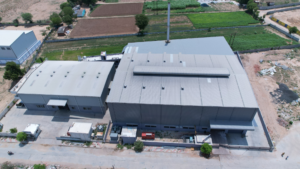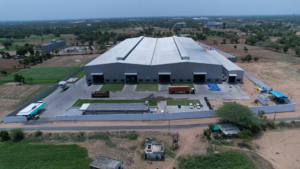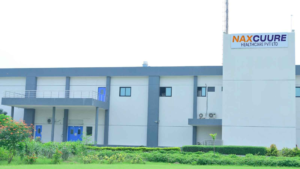Project Overview (5-6 Lines):
Dhanvi Infracon Pvt. Ltd. undertook the complete construction and development of Dharmaji Textiles’ state-of-the-art manufacturing facility. The plant is designed to handle end-to-end processes including printing, dyeing, and finishing of a wide range of fabrics such as twill, tussar, poplin, cotton, and blended cotton. The challenge was to create a robust industrial infrastructure that supports both mass production and high-quality output. Every element was engineered to align with textile-specific needs—humidity control, waste treatment, and streamlined logistics. The facility stands as a modern benchmark for textile manufacturing in India.
1. Features of the Project
- Textile-Centric Design: The plant layout accommodates distinct zones for printing, dyeing, finishing, and packaging.
- Climate Control Integration: Temperature and humidity systems tailored for fabric preservation and processing.
- Waste Management Systems: Built-in ETP & STP units for handling dye and chemical disposal.
- Efficient Workflow: Seamless internal logistics from raw material entry to finished goods dispatch.
- Power Management: Energy-efficient solutions including solar integration and backup generators.
2. Challenges Faced
- Moisture Control: Ensuring consistent indoor environmental conditions to maintain fabric integrity was a key challenge.
- Water Management: Handling water-intensive operations while complying with environmental norms demanded advanced ETP installations.
- Fabric Flow Optimization: Planning layout to ensure zero contamination across stages of textile production.
- Fire & Safety Compliance: Adhering to safety standards with inflammable chemicals and large fabric volumes.
- Deadline Pressure: The client had a tight production schedule, pushing for rapid yet high-quality delivery.
3. Advanced Technologies Used
- Automated Fabric Handling: Conveyor systems and hoists for transporting fabric without manual interference.
- Smart PLCs: Centralized programmable logic controllers to automate dyeing, drying, and heating equipment.
- IoT Sensors: For real-time monitoring of temperature, humidity, and air quality in dyeing and drying units.
- Solar Heating Panels: Reduce energy consumption during drying and pre-treatment stages.
- Digital Control Dashboards: Allow real-time plant operation tracking and analytics.
4. Construction Management Strategy
- Modular Construction Approach: Used to enable phased delivery of operational units.
- Daily Progress Monitoring: Using ERP-based tools for material, labor, and timeline tracking.
- Cross-Functional Teams: Integrated team of MEP engineers, civil engineers, and safety officers.
- Client Coordination: Weekly walkthroughs and progress updates ensured transparency and on-time feedback.
5. Inclusions
- Construction of the main manufacturing building
- Dyeing & printing unit with ventilation systems
- ETP/STP plant setup
- Utility block with water reservoirs & treatment areas
- Electrical substations & cabling
- Fabric storage warehouse
- Fire-fighting infrastructure
6. Exclusions
- Machinery procurement & installation (provided by client)
- Operational HR hiring & training
- Fabric raw material handling
- Finished goods logistics & export services
7. Future Plans
- Green Expansion: Add rooftop solar panels across all structures for energy independence.
- Automation Upgrade: Implementation of AI in quality checks for printed and dyed fabric.
- Rainwater Harvesting: Integrated system to support water reuse for dyeing processes.
- Warehouse Digitization: RFID tracking for fabric rolls and packaging.
- Collaborative R&D Centre: For fabric innovation and sustainability initiatives in partnership with Dharmaji Textiles.
8. Advantages
- Operational Efficiency: Flow-centric layout reduces material transfer time by 30%.
- Cost-Effectiveness: Integrated energy and water recycling cuts utility costs.
- Durability: RCC and steel frame structures ensure long lifecycle with low maintenance.
- Regulatory Compliance: Meets all national environmental and safety standards.
- Brand Value Boost: High-end infrastructure enhances Dharmaji Textiles’ industry positioning.
9. Disadvantages / Limitations
- High Initial Investment: Premium materials and systems increased upfront construction cost.
- Maintenance Complexity: Advanced systems require skilled technicians for regular upkeep.
- Dependency on Utilities: Water and electricity requirements are high in peak operations.
- Training Period: Staff training needed for handling new automated and IoT systems.
Conclusion
This project stands as a testament to Dhanvi Infracon Pvt. Ltd.’s expertise in industrial construction with industry-specific customizations. The Dharmaji Textiles plant reflects the ideal harmony between robust infrastructure, smart technologies, and environmental responsibility. With this milestone, Dhanvi Infracon reaffirms its commitment to building the future of Indian manufacturing—brick by brick, thread by thread.





